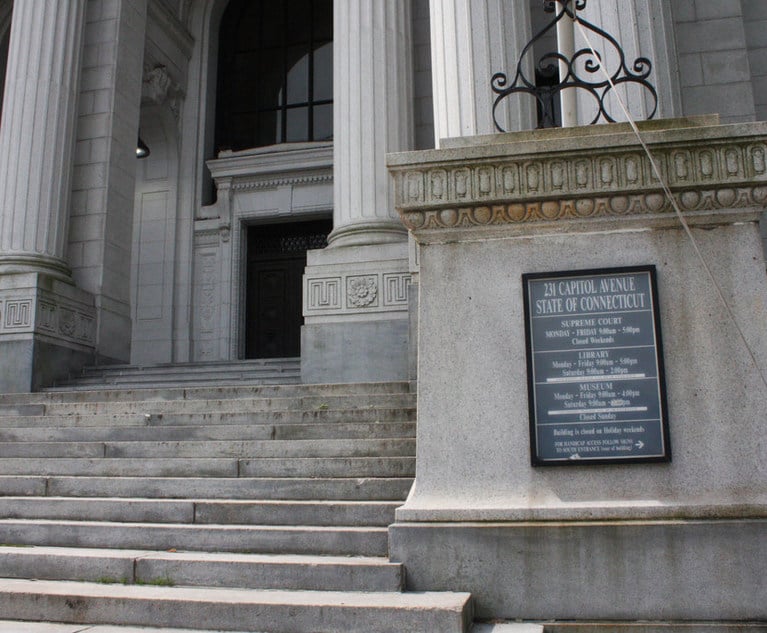Consumers Should Have a Dedicated Medical Emergency Fund
Out of those who had significant health care costs in 2018, 40% still held debt from those expenses by the end of the year.
June 04, 2020 at 10:31 AM
4 minute read
The original version of this story was published on Law.com
 The reason emergency funds exist is to provide financial support in the case of a significant unforeseen expense, and health care costs are one of the top expenses most people will face.
The reason emergency funds exist is to provide financial support in the case of a significant unforeseen expense, and health care costs are one of the top expenses most people will face.
If there were a financial 10 Commandments, establishing an emergency fund with three to six months' worth of living expenses would be near the top. Most experts will tell you this is a critical requirement for overall financial health and well-being.
What far fewer people are talking about, though, is the importance of creating a separate emergency fund earmarked for potential health care costs. By using health savings accounts, or HSAs, as dedicated medical emergency funds, savvy savers can take advantage of unparalleled HSA tax breaks and save big money on the health care costs they incur.
Related: 7 takeaways on offering emergency savings programs in post-COVID-19 America
The reason emergency funds exist is to provide financial support in the case of a significant unforeseen expense, and health care costs are one of the top expenses most people will face. According to the Federal Reserve, 20% of adults incurred major, unexpected medical expenses in 2018, with a median cost of more than $1,000. And out of those who had significant health care costs, 40% still held debt from those expenses by the end of the year.
For many people, large and unexpected health care costs are unfortunately likely to be a question of when, rather than if. But according to an RxSaver survey, less than one in three people have a dedicated medical emergency fund set up.
This could be due to people thinking that when it comes to saving for health care expenses, all savings accounts are created equal. However, just by choosing HSAs as their medical emergency funds, smart consumers can unlock significant discounts on their health care costs. Money goes into an HSA tax-free or tax-deductible, earnings and interest grow tax-free, and funds withdrawn for qualified medical expenses are tax-free as well. There may be no such thing as a free lunch, but HSAs are the next best thing.
Since HSAs don't have use-it-or-lose-it limits, funds can stay growing until they're needed. HSA funds can even be invested to cover retirement health care costs. In addition, HSAs are portable, meaning they stay with account holders when they change jobs or retire. And finally, account holders can use HSA funds to pay for their spouse and tax dependents' medical expenses tax-free, even if they're on different health plans.
These features make HSAs the hands-down best choice for saving for current or future health care costs. And knowing how frequently unexpected medical expenses occur, building up HSA funds to cover those costs is an easy and powerful way to stretch savings farther.
Building up an emergency fund is an essential foundation for financial security. But rather than keeping everything in one account, consider dedicating a portion of savings into an HSA. By establishing HSAs as your medical emergency fund, you can ensure you're saving the most money possible on health care expenses and paving the way for a happy, healthy future.
James Denison is director of marketing for HealthSavings, one of the country's original health savings account (HSA) providers. HealthSavings empowers consumer-driven health plan participants to invest in institutional-class funds so they can grow their savings tax-free and meet their financial goals for a happy, healthy future. Denison is passionate about HSAs as a retirement strategy, health care consumerism, and medical cost transparency.
Read more:
This content has been archived. It is available through our partners, LexisNexis® and Bloomberg Law.
To view this content, please continue to their sites.
Not a Lexis Subscriber?
Subscribe Now
Not a Bloomberg Law Subscriber?
Subscribe Now
NOT FOR REPRINT
© 2025 ALM Global, LLC, All Rights Reserved. Request academic re-use from www.copyright.com. All other uses, submit a request to [email protected]. For more information visit Asset & Logo Licensing.
You Might Like
View All
Coerced Confessions and the Burden of Proof Beyond Reasonable Doubt


35 Years After CT's Affordable Housing Act, Progress Remains a Struggle
4 minute readTrending Stories
- 1Uber Files RICO Suit Against Plaintiff-Side Firms Alleging Fraudulent Injury Claims
- 2The Law Firm Disrupted: Scrutinizing the Elephant More Than the Mouse
- 3Inherent Diminished Value Damages Unavailable to 3rd-Party Claimants, Court Says
- 4Pa. Defense Firm Sued by Client Over Ex-Eagles Player's $43.5M Med Mal Win
- 5Losses Mount at Morris Manning, but Departing Ex-Chair Stays Bullish About His Old Firm's Future
Who Got The Work
J. Brugh Lower of Gibbons has entered an appearance for industrial equipment supplier Devco Corporation in a pending trademark infringement lawsuit. The suit, accusing the defendant of selling knock-off Graco products, was filed Dec. 18 in New Jersey District Court by Rivkin Radler on behalf of Graco Inc. and Graco Minnesota. The case, assigned to U.S. District Judge Zahid N. Quraishi, is 3:24-cv-11294, Graco Inc. et al v. Devco Corporation.
Who Got The Work
Rebecca Maller-Stein and Kent A. Yalowitz of Arnold & Porter Kaye Scholer have entered their appearances for Hanaco Venture Capital and its executives, Lior Prosor and David Frankel, in a pending securities lawsuit. The action, filed on Dec. 24 in New York Southern District Court by Zell, Aron & Co. on behalf of Goldeneye Advisors, accuses the defendants of negligently and fraudulently managing the plaintiff's $1 million investment. The case, assigned to U.S. District Judge Vernon S. Broderick, is 1:24-cv-09918, Goldeneye Advisors, LLC v. Hanaco Venture Capital, Ltd. et al.
Who Got The Work
Attorneys from A&O Shearman has stepped in as defense counsel for Toronto-Dominion Bank and other defendants in a pending securities class action. The suit, filed Dec. 11 in New York Southern District Court by Bleichmar Fonti & Auld, accuses the defendants of concealing the bank's 'pervasive' deficiencies in regards to its compliance with the Bank Secrecy Act and the quality of its anti-money laundering controls. The case, assigned to U.S. District Judge Arun Subramanian, is 1:24-cv-09445, Gonzalez v. The Toronto-Dominion Bank et al.
Who Got The Work
Crown Castle International, a Pennsylvania company providing shared communications infrastructure, has turned to Luke D. Wolf of Gordon Rees Scully Mansukhani to fend off a pending breach-of-contract lawsuit. The court action, filed Nov. 25 in Michigan Eastern District Court by Hooper Hathaway PC on behalf of The Town Residences LLC, accuses Crown Castle of failing to transfer approximately $30,000 in utility payments from T-Mobile in breach of a roof-top lease and assignment agreement. The case, assigned to U.S. District Judge Susan K. Declercq, is 2:24-cv-13131, The Town Residences LLC v. T-Mobile US, Inc. et al.
Who Got The Work
Wilfred P. Coronato and Daniel M. Schwartz of McCarter & English have stepped in as defense counsel to Electrolux Home Products Inc. in a pending product liability lawsuit. The court action, filed Nov. 26 in New York Eastern District Court by Poulos Lopiccolo PC and Nagel Rice LLP on behalf of David Stern, alleges that the defendant's refrigerators’ drawers and shelving repeatedly break and fall apart within months after purchase. The case, assigned to U.S. District Judge Joan M. Azrack, is 2:24-cv-08204, Stern v. Electrolux Home Products, Inc.
Featured Firms
Law Offices of Gary Martin Hays & Associates, P.C.
(470) 294-1674
Law Offices of Mark E. Salomone
(857) 444-6468
Smith & Hassler
(713) 739-1250











